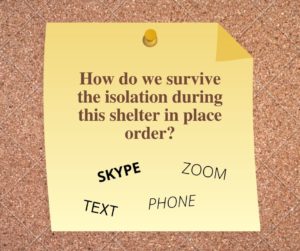My grocery cart was filled with Easter baskets, chocolate bunnies, various candies and small stuffed animals – lamb, rabbits ducks. I passed another shopper who could easily be a grandmother. She said “Grandkids?” My response “No this is for kids who have aged out of foster care.” The elderly woman stopped and asked what I meant by ‘aged out.’
We continued a conversation – not at the required six feet. The elderly woman was sharing about what she bought for her grandkids. The next thing I know she had reached into my basket and picked up a stuffed lamb.
“OMG” I thought to myself “are you not watching the news?” The second thought followed “She is lonely.” The response the woman received – a calm discussion of Easter traditions.
Loneliness is more deadly than this coronavirus. Many studies of loneliness have been done – largely in part to the discovery made during one of the first studies at the University of Chicago. It was found that people who are lonely have higher white blood cell count.
A high white blood cell count is a good thing if you have an infection or a wound.
However, prolonged high white blood cell count is not good for the body. It leads to tissue breakdown and inflammation. These are the root of many chronic diseases.
Loneliness has a wide range of negative effects on both physical and mental health, including:
- Cardiovascular disease or stroke
- Increased stress levels
- Decreased memory and learning
- Antisocial behavior
- Poor decision-making
- Alcoholism and drug abuse
- The progression of Alzheimer’s disease
- Altered brain function
- Depression and suicide
The Shelter in Place Orders can lead to loneliness if one isn’t proactive to make connections.
This is comparable to those who retire without a plan. Many people’s social circle is from their workplace. I encourage clients to develop their passions and interest before their last day of work. Connect those passions and interests with clubs and meet-up groups. Have a social network ready to replace your social network from your workplace.
But how do we survive the isolation during this shelter in place order?
I am resharing excerpts from the post my teacher sister sent me. Its tips suggested by Margie Donion a doctoral level Psychologist. (For a full list and ideas for children, call our office.)
- Reach out to others, at least once daily for thirty minutes. Try to do FaceTime, Skype, phone calls, texting-connect with other people to seek and provide support.
- Get out at least once a day, for at least thirty minutes. If you are concerned of contact, try first thing in the morning, or later in the evening, and try less traveled streets and avenues. If you are high risk or living with those who are high risk, open the windows and blast the fan. It is amazing how much fresh air can do for spirits.
- Find some time to move each day, again daily for at least thirty minutes. If you don’t feel comfortable going outside, there are many YouTube videos that offer free movement classes, and if all else fails, turn on the music and have a dance party.
- Stay hydrated and eat well. This one may seem obvious, but stress and eating often don’t mix well, and we find ourselves over-indulging, forgetting to eat, and avoiding food. Drink plenty of water, eat some good and nutritious foods, and challenge yourself to learn how to cook something new!
- Lower expectations and practice radical self-acceptance. We are doing too many things in this moment, under fear and stress. This does not make a formula for excellence. Instead, give yourself what psychologists call “radical self-acceptance”: accepting everything about yourself, your current situation, and your life without questions, blame or pushback. You cannot fail at this-there is no roadmap, no precedent for this, and we are all truly doing the best we an in an impossible situation.
- Give everyone the benefit of the doubt, and a wide berth. A lot of cooped up time can bring out the worst in everyone. Each person will have moments when they will not be at their best. It is important to move with grace through blowups, to not show up to every argument you are invited to, and to not hold grudges and continue disagreements. Everyone is doing the best they can to make it through this.
- Limit social media and COVID conversation, especially around children. One can find tons of information on COVID-19 to consume, and it changes minute to minute. The information is often sensationalized, negatively skewed, and alarmist. Find a few trusted sources that you can check in with consistently, limit it to a few times a day, and set a time limit for yourself on how much you consume (again 30 minutes tops, 2-3 times daily). Keep news and alarming conversations out of earshot from children-they see and hear everything, and can become very frightened by what they hear.
- Find lightness and humor in each day. There is a lot to be worried about, and with good reason. Counterbalance this heaviness with something funny each day; cat videos on YouTube, a stand-up show on Netflix, a funny movie-we all need a little comedic relief in our day, every day.
- Help others, find ways, big and small, to give back to others. Support restaurants, offer to grocery shop, check in with elderly neighbors, write psychological wellness tips for others-helping others gives us a sense of agency when things seem out of control.
- Reach out for help-your team is there for you. If you have a therapist or psychiatrist, they are available to you, even at a distance. Keep up your medications and your therapy sessions the best you can. If you are having difficulty coping, seek out help for the first time. There are mental health people on the ready to help you through this crisis. Your children’s teachers and related service providers will do anything within their power to help.
- Remind yourself daily that this is temporary. It seems in the midst of this quarantine that it will never end. It is terrifying to think of the road stretching ahead of us. Please take time to remind yourself that although this is very scary and difficult, and will go on for an undetermined amount of time, it is a season of life and it will pass. We will return to feeling free, safe, busy, and connected in the days ahead.
- Find the lesson. This whole crisis can seem sad, senseless, and at times, avoidable. When psychologists work with trauma, a key feature to helping someone work through said trauma is to help them find their agency, the potential positive outcomes they can affect, the meaning and construction that can come out of destruction. What can each of us learn here, in big and small ways, from this crisis? What needs to change in ourselves, our homes, our communities, our nation, and our world?
One lesson you might realize from this experience is the importance of human connection and a social network. You may need to be intentional about creating that network when the business of life resumes; it could get pushed aside.
“Whether or not you are healthy, those who are more socially connected live longer.” Julianne Holt-Lunstad, a professor of psychology and neuroscience at Bingham Young University states
Similar Blog Post:


